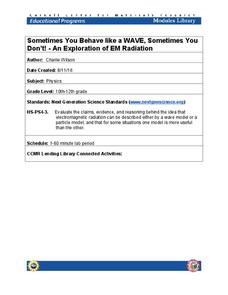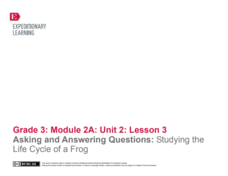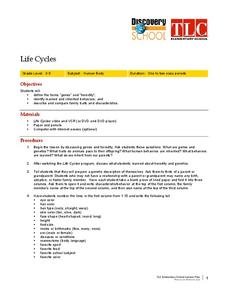Chicago Botanic Garden
Climate Change Around the World
It is unknown if cloud cover increases in response to carbon dioxide levels changing, helping climate change slow down, or if cloud cover decreases, allowing Earth to warm faster. Part four in the series of five lessons has classes...
Cornell University
Sometimes You Behave Like a WAVE, Sometimes You Don't!
Electromagnetic radiation behaves like both a wave and a particle. Help classes explore this concept through a lab investigation. Young scientists create optical interference patterns on a glass slide using a carbon layer. They analyze...
Channel Islands Film
Cache: Lesson Plan 1 - Grades 9-12
Archaeologists have discovered a cache of Native American relics. They want to preserve these relics by removing them from the rapidly eroding site to a lab where they can be studied. Native American traditions demand that the items be...
Polar Trec
Science in Antarctica
PolarTREC brings polar researchers and educators together to benefit both science and education. Pupils select one research project in Antarctica to explore and present to their peers. Scholars polish research and presentation skills as...
K20 LEARN
Water We Going To Do? Floodplains And Watershed Management
How has human activity affected Earth's watersheds? An action-packed lesson plan, part of the K20 Center, examines water's ability to go with the flow regardless of what is in its path. Scholars build model watersheds, examine time-lapse...
National Nanotechnology Infrastructure Network
Understanding Wave Motion - Slinky vs. Snaky: Which Spring is Dominant?
Ride the wave to an understanding of refraction! The first in a series of two inquiry-based lessons challenges learners to create transverse waves with two different types of springs. As their wave hits an object, they observe the change...
Montana State University
Climb into Action!
Climate change affects even the largest and intimidating of landforms—even Mount Everest! A resource helps teach learners the connection between global climate change and its effects on Earth. Activities include videos, class discussion,...
Children's Commissioner for Wales
Special Mission — Our Rights
Introduce young learners to the list of children's rights as defined by the UN Convention on the Rights of the Child (UNCRC) with a series of activities that get class members thinking about what they need to grow up safely and happily.
EngageNY
Asking and Answering Questions: Studying the Life Cycle of a Frog
A lesson challenges learners to ask and answer questions about the life cycle of a frog. With a class read-aloud, partner discussion, and notebook reflections, scholars complete a three-page worksheet to prove their understanding of the...
Alabama Wildlife Federation
Butterflies without Borders
Some living things go to extreme measures to avoid the cold. A three-part activity guides learners through the migration of the monarch butterfly. After studying the life cycle of the monarch butterfly, pupils learn the process of...
Nemours KidsHealth
Empathy: Grades 6-8
Middle schoolers develop an understanding of what empathy is and learn what they can do to show compassion to others with the help of articles and activities in a four-page packet. Learners develop PSAs to post around the school, engage...
Nemours KidsHealth
Obesity: Grades 9-12
High schoolers take on the role of the nation's first Teen Nutrition and Fitness Czars and create tips that can be texted to other teens to remind them about healthy eating and exercising. Groups read articles to gather background...
Health Smart Virginia
Social Emotional Skills
A list of activity ideas, lessons, and resource links all focus on kindness, empathy, and mindfulness. Five steps offer experience in role-play, crafts, writing, thoughtful discussions, and more!
Anti-Defamation League
Building a Foundation for Safe and Kind Online Communication
Put a spotlight on internet safety with a lesson designed to boost positive online communication. Scholars listen to the story, Yettele's Feathers by Joan Rothenberg, and answer questions. An emoji-themed handout challenges pupils to...
Anti-Defamation League
Say Something: Discussion Guide for Grades 2-4
Empower pupils to stop bullying when they see or experience it with a activity that showcases the book, Say Something by Margaret Paula Moss. After reading the tale and thoughtfully discussing its characters, they share their own...
K20 LEARN
Lord of the Flies Unit, Lesson 7: Good To Be Bad
The seventh lesson in the Lord of the Flies unit asks scholars to consider whether or not an individual can overcome the worst thing they have ever done. Groups read different articles related to the question, share their expertise in a...
Anti-Defamation League
Is Gaming a Boy's Club? Women, Video Games and Sexism
High school juniors and seniors investigate the representation of women in video games. They watch a video of researcher Anita Sarkeesian who describes the response to her research attempts, and read articles related to the topic. To...
Curated OER
Ecology and the Conservation of Natural Resources
Young scholars examine the habits of various organism and evaluate the need for conserving natural resources. They role-play as migrating birds traveling between habitats encountering hazards along the way. They observe animals in a...
Curated OER
Life Cycles
Students identify inherited traits. In this heredity lesson, students watch a video and construct a genetic description of themselves.
Curated OER
What is Tact?
Students identify tact and how to use it when being honest. In this tact instructional activity, students discuss examples of tact and complete a related worksheet.
Curated OER
All Aboard the Peace Train
Second graders discuss the story "The Little Engine That Could" and highlight the quality of perseverance. They write a paragraph about a time they needed perseverance to succeed.
Curated OER
PERIODICAL CICADA SURVIVAL
Students explore defense mechanisms involved in predatory/prey relationships.
Curated OER
What Do Monarch Caterpillars Eat?
Learners record and analyze what types of food monarch caterpillars will eat.
Curated OER
Resistance to Parents
Students examine family life issues. In this interpersonal relationships lesson, students discuss typical resistance to parents from teen children. Students also discuss options for children dealing with difficult or abusive home life.
Other popular searches
- Behaviorism Skits
- Behaviorism Theory
- Pink and Say Behaviorism
- Psychology Behaviorism
- Math Behaviorism
- Elementary Behaviorism
- Theories of Behaviorism
- Behaviorism Lesson Plans
- Multiplying Math Behaviorism
- Behaviorism Watson
- Behaviorism Theory Classroom

























